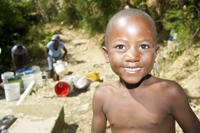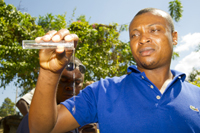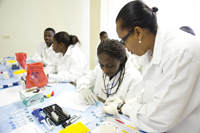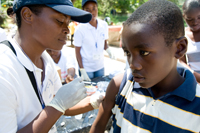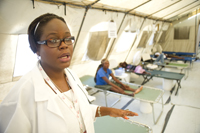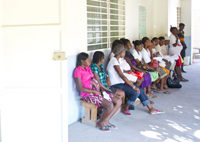CDC Foundation, CDC and Donors Partner to Strengthen Haiti’s Public Health Infrastructure
The CDC Foundation, the U.S. Centers for Disease Control and Prevention (CDC), Haiti’s Ministry of Public Health and Population (Ministère de la Santé Publique et de la Population or MSPP) and the U.S. Embassy in Haiti held a ribbon cutting ceremony in February 2013 for two new public health buildings in Port-au-Prince. These buildings were funded by more than $3.2 million in donations by CDC Foundation partners.
BACKGROUND
Following Haiti’s devastating earthquake in 2010, staff in Haiti’s MSPP worked from temporary buildings. Two new buildings designed to provide a longer-term infrastructure solution for Haiti’s MSPP were constructed through a partnership established by the CDC Foundation.
One building replaced the MSPP facility destroyed in the earthquake. This building is serving as a central office from which all public health activities are being managed by Haiti's Minister of Public Health and Population. The second building for MSPP’s Division of Epidemiology, Laboratory and Research (Direction d’Epidémiologie, de Laboratoire et de Recherches or DELR) is located in the National Public Health Laboratory (Laboratoire National de Santé Publique) complex. This second building houses a portion of MSPP’s surveillance, epidemiology and laboratory staff and CDC’s staff in Haiti, who are now working side-by-side in the country. Learn More
The building for Haiti’s DELR and CDC staff was funded by contributions from the GE Foundation and the Robert Wood Johnson Foundation. Kaiser Permanente provided funding for the MSPP central office. In-kind contributions were provided by Proteus On-Demand to increase the size of the MSPP building and make enhancements within the facility. Medical technology company BD (Becton, Dickinson and Company), which donated syringes and other supplies for a national measles and rubella immunization campaign in Haiti. Learn More
About Public Health Advances in Haiti since the 2010 earthquake
